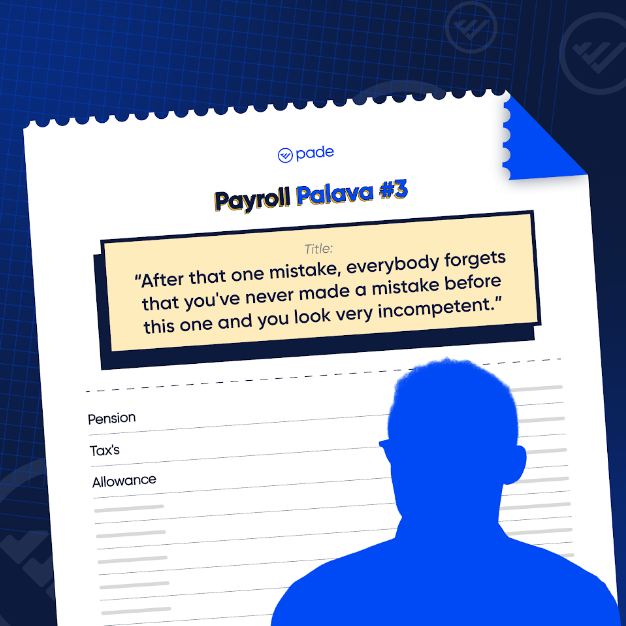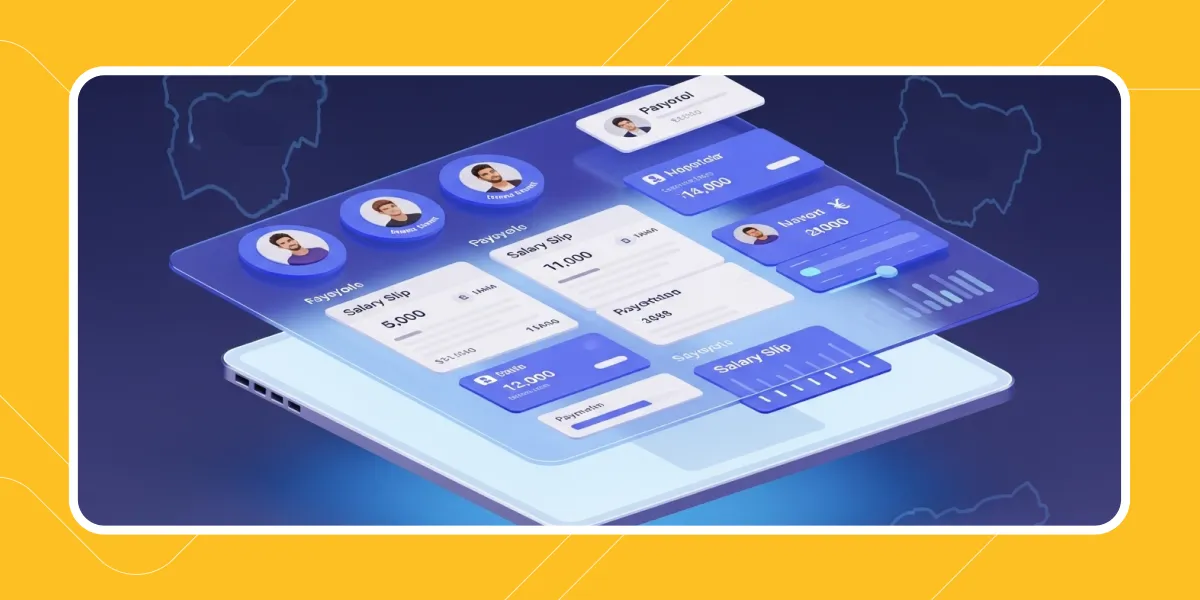Payroll Palava is a monthly series that provides a safe space to explore the big, the bad, and the ugly of payroll from the perspective of real people, and the importance of embracing technology.
So, what is your payroll story?
Where do you want me to start from?
Okay, so let me start with my most interesting payroll story regarding payroll problems. Um, first of all, is this supposed to be an anonymous thing? Or would you want to put a name to it?
It depends on you. All the ones we’ve been doing, they’ve asked to be anonymous, so that’s how we’ve done them.
My preference would be to remain anonymous. I don’t mind my name being out there but when it comes to payroll, it is sensitive information. So this will be anonymous.
That’s fine. As long as you being anonymous means that you’ll give us all of the tea. Yeah.
So my story, right?
So a lot of companies have an ERP. An ERP (Enterprise Reporting System) that comes with a full suite for your business needs. They have their payroll system, finance system for procurement and the like.
We had one of those in this organisation, but we outsourced payroll for some funny reasons. Our HR information system was mostly just for HR information and some level of performance management but the payroll module wasn’t well defined.
So, fast forward, one day I was working on payroll, and this is a company of over 250 people, you get and um, we concluded performance review for 2022 at the start of 2023 and then we’re doing, like, performance-based bonuses and salary increments for people. Everybody had like a percentage increase according to how they performed. For example, if you’re a 5/5 performer, you get X amount of salary increase, and X amount of bonus for the month.
It was all manual because we didn’t have a payroll system. So, what we did was outsource the actual payroll run to an agency.
The process was, that I made the payroll changes manually, from new joiners’ details, to exit details, to salary review details, to overtime details for people who work overtime, to sales bonus details. Mind you, we had a sales team across different regions. They had certain targets that if they met on a month-on-month basis, they’d activate a certain bonus for their region that would then be shared across the board.
All of this information happens across over 200 employees every month. A lot of calculations go into it, and this is all done manually on an Excel sheet.
At the beginning of every month, I send overtime computation sheets to all the heads of departments to populate the overtime schedules for their direct reports and then I collate them.
So, imagine you get overtime schedules for over 200 employees, right? And you’re manually having to prorate it on Excel sheets, tying employee IDs to their names. Sometimes these managers don’t use the actual name you have on the system. They use the name that they know you for. For instance, your name is Stella, right? But on the sheet, they will just put KC there and then I would have to do the hard work of marrying Stella to KC on the system and stuff like that. Nomenclature was not always clear, so I had to do the hard draft of actually collating these things and reconciling them.
I did all of that but then that’s where the human/mechanical error came in. You put everything on an Excel sheet, you add formulas, it gives you your percentages and everything, and then you drag down, which is what everybody does on Excel. Once you put the formulas at the top, you drag them down and everything looks fine. I did my computation. Everything was fine. Overtime was fine. But then, because we were doing that performance-based review, it was scattered across the board, you understand?
You have a bunch of people who are on the same job level, who have the same salaries but now, based on the fact that one person performed as a 5/5 performer, and the other person performed as a 3/5 performer, their salary increases will change. So unlike before, where it was uniform, and if something stood out you’d be able to tell, this time the percentages differ. Except you are lucky enough to spot those things because it is you just dragging down formulas.
Fast forward. I did my part. I sent it to the Head of People in Africa. She reviewed it fine. And then we sent it to our payroll consultants, who then put it in their own payroll system. Similar to what Pade offers.
Yeah? It was probably a white-label payroll solution. We have the same solution and consultants that use it for the businesses they consult for.
Exactly. So when I send them the documents, they populate those changes on the system in cases of new joiners exits, a new benefit or a bonus and so on.
So, it’s easy from the system, because you can just make these changes in the employee’s profile and stuff but this one is an Excel sheet. The consultancy doesn’t know these people so they don’t have context. They just copy and paste or they just upload, maybe as a CSV file.
There’s barely any review or anything done. But the thing about Excel files or doing things manually is that it’s easy to do when it’s for five employees, two employees, or 10 employees, but when you have to do it for 200 employees, things can easily fall through the cracks.
So I did my thing, everything looked fine, and everything checked out. Then, I sent it to my line manager, who also reviewed and everything was fine. And then we sent it over to our payroll consultants who ran with everything, sent it back to us, and everything still looked good. We sent it to finance. Finance processed payment to everybody, and then upon processing of salaries on payday, I got calls from employees saying, “Oh, there’s something wrong with my salary.” Oh this, oh that from like, three people, four people, and I’m like this is strange. It was the first time something like that was happening.
And this is after it has gone through how many stages of approval o?
And review! Do you understand?
The gross salary was correct. The percentages were correct. Different companies have different percentages they assign to basic housing and transport. At the time, we calculated 35% of your salary was for basic, 45% was for housing, and the remaining 20% was for transport.
Apparently, I think there was a value in one of the formulas. So when I dragged down that formula the computation for basic housing and transport changed. So, instead of the payroll consultants picking the gross value, and letting the system compute the rest, the person in charge picked the computation of the basic housing and transport instead and that was where there was a problem with the formula.
For example, an employee’s annual gross salary is 7 million naira while their monthly salary is 450k but because of the system, the person’s annual gross salary is still at 7 million naira but the amount the person collected, was probably the amount they were collecting before, or slightly higher, because the formula did not exactly apply to the actual breakdown of their basic housing and transport.
Then some people didn’t have complete salaries, and it just messed up the system because even from a reporting perspective, the contract says, effective XYZ date your salary is now XYZ, but your payslip and payroll then say something different. That’s where the confusion came from.
Mind you, this thing had already passed through so many stages of approval, so many series of reviews, and a lot of manual work had gone into this. So my payroll cycle at the time always started from the beginning of the month. The first thing I do is send payroll inputs, and then by the 10th, everybody must have sent in their payroll input. Then I collate from the 10th to the 13th, review for things, do another stage of reviews on the 15th, and then I send it.
So you basically spend the entire month on Payroll.
Yes, and that’s just one of the things I was doing!
In some offices or some establishments where they have a big enough staff size, they hire a payroll officer, because payroll is a lot of work, especially if you are doing it manually.
So, if you don’t exactly understand the hard grafting that goes into payroll, doing it manually, and the Excel sheet computation or ERP computation, you won’t understand, or cherish how easy technology makes payroll.
What you just need to do as an HR person is make sure that your system is always up to date at any point in time. When there’s a salary review, immediately after it’s done, you update it on the person’s profile. When somebody exits, immediately go and make an exit request. If you do all of those things, at the end of the month you just need to go and run your payroll. At some point, you can even just automate your payroll so it runs without your input on your set payday.
Payroll is a very cumbersome task especially if it’s a big establishment. But then, if you have a system in use, especially when your business is a little bit smaller, and you make sure that that is maintained, you would never really have payroll problems.
One of the reasons why my payroll mistake happened was because I didn’t have a system that could let me know that, hey, there’s a mistake here or the computation for this and that seems off.
Yeah. So, as an HR professional and as a person, how did that make you feel?
I mean, I felt shitty.
You understand how sensitive money and payroll are, right? You get into HR and they tell you that one side of HR that you absolutely cannot joke with is payroll. The smallest mistake affects everything, both from a reporting perspective and an audit perspective. So it’s like after that one mistake, everybody forgets that you’ve never made a mistake before this one and you look very incompetent, and that can affect your performance and confidence.
You start to question yourself. Was it that I was not paying much attention? You start to question your own attention to detail and then you now feel as if everybody, nobody, wants to take ownership of anything. I made a mistake, but you reviewed it. Why didn’t you also notice it? What are you reviewing if you did not spot all those things? But you cannot go saying that to someone you report to even though the idea of a reviewer is to check for mistakes, but you can’t exactly blame them sha
There was also trust in the kind of work I’ve done all this while that everyone felt like if this guy does this thing, then I don’t need to review it much. And then that same person who has that trust in you starts to second guess you. And in subsequent periods, they’re telling you, oh, let’s come and start going through everything, line by line. You start to feel some type of way.
The truth is that payroll is very sensitive. People’s salaries are very, very sensitive. Money is very sensitive. For most, when you make that mistake once you can’t make subsequent payments until the next payroll cycle. Any other payroll routine must happen only in the subsequent months. Except it’s in very, very extreme circumstances that we then have to make a consensus, of which it’s not even run through normal payroll. We’ll have to maybe raise a requisition through finance to make a net payment of something to you, and then we get it off the books.
That one mistake you made has a huge impact across the board and mitigating it is it makes you look stupid and embarrassed and you feel like you’re not good enough. And then there’s also a thing of trust. Employees need to trust the system for them to understand that, okay, that was just a mistake. There’s trust and integrity as well. Any mistake in HR has a ripple effect, either on employer branding, employee experience, trust and credibility or integrity.

Something occurred to me while you were speaking. If you had to go through all of this journey for approval and this mistake still happened, what happens with payslips? How do you give your employees their payslips?
Same thing. It’s also outsourced to the payroll consultant. So after we pay, then I have to follow up with them and because it’s a consultant, sometimes they might be having issues with their system or something and they end up pushing the wrong or erroneous payslips to the employees.
Because a lot of things are manual, there are a lot of errors and inconsistencies, and people not getting their payslips, or payslips going into their junk folder. When they send it to our employees from their end, I’d have to ask them to send me a zip folder of everybody’s payslip. So anybody that doesn’t get theirs directly will come to me and I’d then have to dig it out and send it to their email directly. It was just a lot of manual and human intervention that made the entire process cumbersome. Time I could spend doing other things, I spend it manually running payroll.
I’m guessing that the payroll consultancy also remits their taxes and pensions.
Yes. We outsourced everything and then guess what? That’s an extra cost to the business as well because, for everything that they do, they’ll charge you. So the day you want to go and say, oh, we need to do a tax filing, they’ll tell you there’s a different charge and invoice you again.
After spending all of that money, you still have to deal with all of these mistakes?
Yes.
It became annoying because it was almost a case of, are these guys just not competent? And because there were too many factors, there were certain things that were not within our control. So if there was a mistake from one person’s end that could easily just be corrected, yeah, he has to go through a bureaucratic process of, oh, I’m reaching out to somebody from another end who has to update something on their system and they might not even understand clearly what I need them to update. And then they’ll go and update rubbish, then send back rubbish to me or send rubbish to the employee, you get?
I mean, it goes without saying that a lot of things would have been different with technology, right?
100%. With the right technology.
I mean Excel is a technological tool now, but is it the right tool to use for payroll? Most of the time, no.
Especially when you are dealing with a large number of people.
Yes. Exactly.
So, what would you advise HR professionals who have made this mistake, let’s say this month, or who have made this mistake before? How can they move past it? How do they mitigate it? For those that haven’t, how do they avoid it? How do you keep it?
Um, well, number one, try and get rid of Excel sheets and get an actual system that works and that solves your problem, end to end.
Payroll should not be treated in isolation. Payroll goes with an HR information system as well. Get the right tool to solve your problems. Get something that integrates well with your existing human resource information system and can feed information directly from there, and can also help you with tax filing and tax remittance with ease, so valuable time you could spend doing other things you’re not spending on payroll.
Like I said earlier, certain businesses have one person handling payroll but then when you check it, it’s not like there are a lot of changes going on. The human resource business partner can make those changes so you don’t need to hire a full-blown manpower to handle payroll. As things are happening in real time, they are being updated in real-time. You just need to schedule your payroll, review your final entries and variance report, and then run your payroll.
So invest in the right technology and the right systems that feed into your already existing systems. And if you don’t already have one, I think you should get Pade as a tool. I have loved using them so far.
Aw, thank youuuuu! That’ll be all. Thanks again for your time.
Sure. Anytime.
______________________________
Are you an HR professional who is willing to share your story so others can learn from you?
Or are you an employee who has been on the receiving side of a payroll mistake?
We’d love to hear your story too! We’ll even keep you anonymous if you want. Click here, fill out the form and we’ll reach out to you.
Pade is a people management software that simplifies HR & Payroll management from end to end, ensuring pay from work, people of work and places of work are fulfilled. Don’t believe us? Schedule a demo here to see. It’s free!






